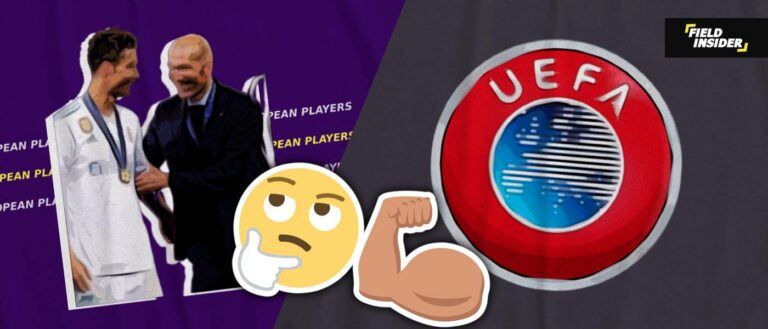How Do Football (Soccer) Contracts Work? Complete Guide
Football contracts form the backbone of the professional game, binding clubs, players, and coaches in a complex web of agreements, outlining responsibilities, compensation, and terms of engagement.
From the standard player contract to more specialized agreements, each document contains critical elements like salary, duration, and specific clauses tailored to the individual’s role and the club’s needs.
Key Takeaways
| Aspect | Details |
|---|---|
| About Football Contracts | Breakdown of a football contract as well as sections and elements of football contracts |
| Contract Length | How long do soccer contracts last? |
| Inflation In Football | How the transfer fees paid for soccer players have increased over the years and how it affects football contracts |
| Reasons For Contracts | Why are contracts an important part of the sport? |
| Aspects and Features | Features that are relevant when signing a football contract |
| Unusual Clauses | Some strange clauses that have been included in football (contracts) |
| Top Salary Earners | Take a look at the most lucrative player contracts in football |
What is a Football (Soccer) Contract?
A football (soccer) contract is an agreement between a player and a club that details the player’s employment terms.
The contract will outline the length of the agreement, the player’s salary, and any bonuses or benefits to which they are entitled. It should be noted that players can only sign contracts with clubs with which they are registered.
Common Sections In A Player’s Contract In Soccer
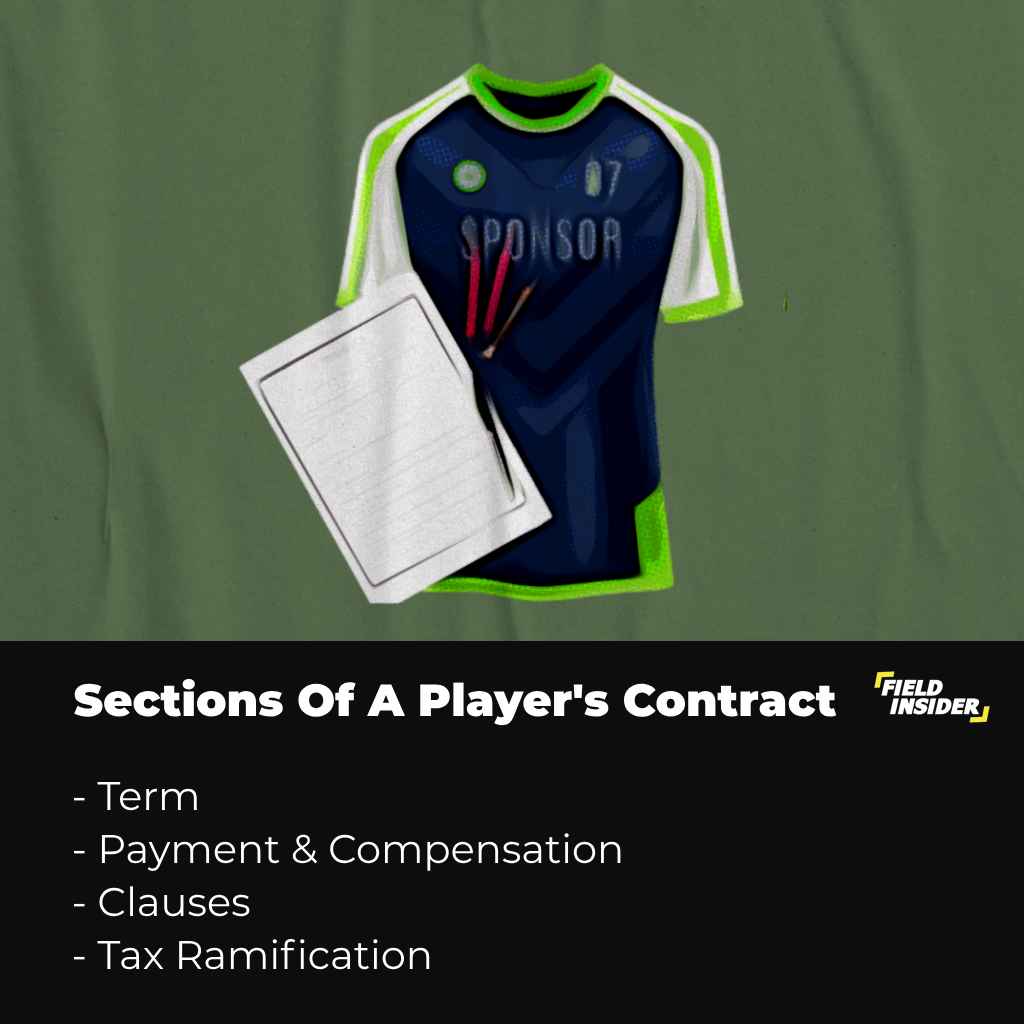
In football, a lot of elements constitute a contract. Going through a player contract, a lot of areas and segments are depicted that give a complete laydown of the contract’s legalities and binding terms.
Some of the sections to look out for include:
- Term: this covers the extent of the contract when it begins, and the time of its expiration.
- Payment & Compensation: these aspects cover the gross salary of players and the basis for payment, either weekly, biweekly, or monthly. They also show the total value of a player’s contract for the duration of the contract.
- Physical Condition & Injury: generally, this talks about the physical and mental condition a player is expected to maintain while he plays for the club. It also enumerates the provisions for healthcare if he gets injured during the course of service (playing or training).
- Termination; a vivid enumeration of the conditions that can lead to the abrupt end (termination) of the contract.
- Tax Ramification: This covers issues regarding tax payment and the involvement of a team/league in the tax situations of players.
- Clauses: an agreement on specific terms and conditions that highlights a distinct need or want from either of the parties.
- Bonuses and Add-ons: Special packages and added benefits players can get aside from the stipulated salary.
- Other Legalities: These could include sections that give details on legal issues such as the need to abide by the laws of the given state, dispute, and dispute resolution.
What is the Purpose of a Football (Soccer) Contract?
Footballer contracts essentially state that the club owns the player for the duration of the contract. This means that the player cannot leave the club to play for another team unless another club makes a transfer offer.
The selling club then accepts the offer. If the player’s team refuses to let them leave, the player has no recourse until the contract expires. That means the player is free to negotiate terms with any club.
Unless they are nearing the end of their careers, players frequently sign long-term contracts (around 4-5 years). This appears to give the club power over the player.
How Long Can A Football (Soccer) Contract Be?
The duration to which a soccer contract can hold depends on the soccer league in question. However, the average length of a soccer contract is about 4-6 years.
This does not mean that a player’s contract can not be extended above this time frame. In fact, there are many clubs in European football that have signed players on very long-term contracts.
A very prominent example is the signing of Enzo Fernandez and Mykhailo Mudryk, for Chelsea, to an eight-and-a-half-year deal.
Factors That Influence The Length Of A Football (Soccer) Contract
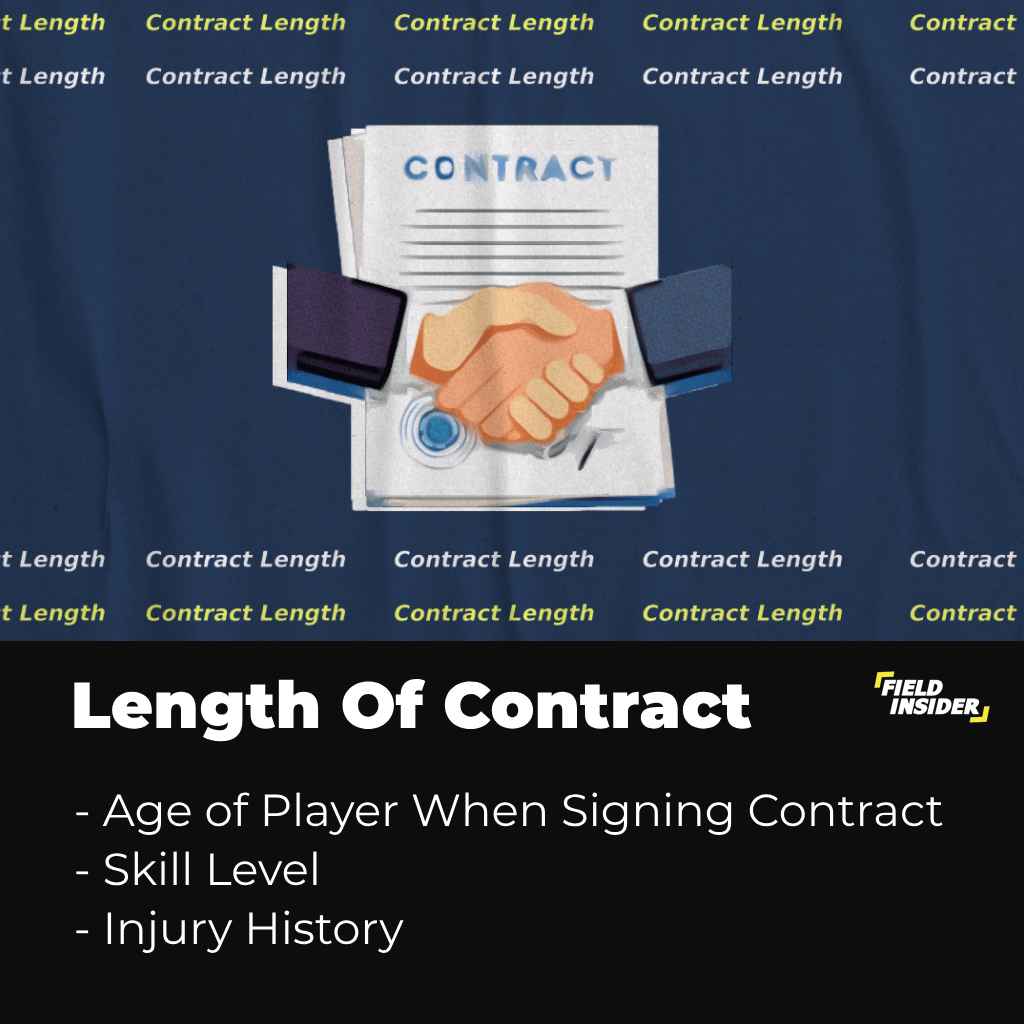
Not every player in football is given the same length of contract duration. Variations in the contract length for footballers are due to factors such as,
- Age of soccer player
- Skill level and performance
- Injury history
- Negotiating strength
- Clubs interest
Research and Analysis
The Journal of Physical Education and Sport released a publication that was released by Research Gates in May 2021.
The publication titled “Factors Affecting the Value of Football Players in the Transfer Market” showed how there had been an increase in the payments made to clubs for players over the year in the Ekstraklasa league.
The Ekstraklasa football league is one of the top leagues in Poland, and the research uncovered:
- The first shows that there has been an increase in the average transfer fees paid for players in the league. From the chart above, it is evident that, over the last 20 years, transfer fees have increased from £0.5 million to an average of £3 million.
This finding can also be related to other soccer leagues, as football has grown worldwide.
Moreover, the increase in transfer fees to clubs also shows that there has been an increase in the average contractual salary paid to players over the same time frame.
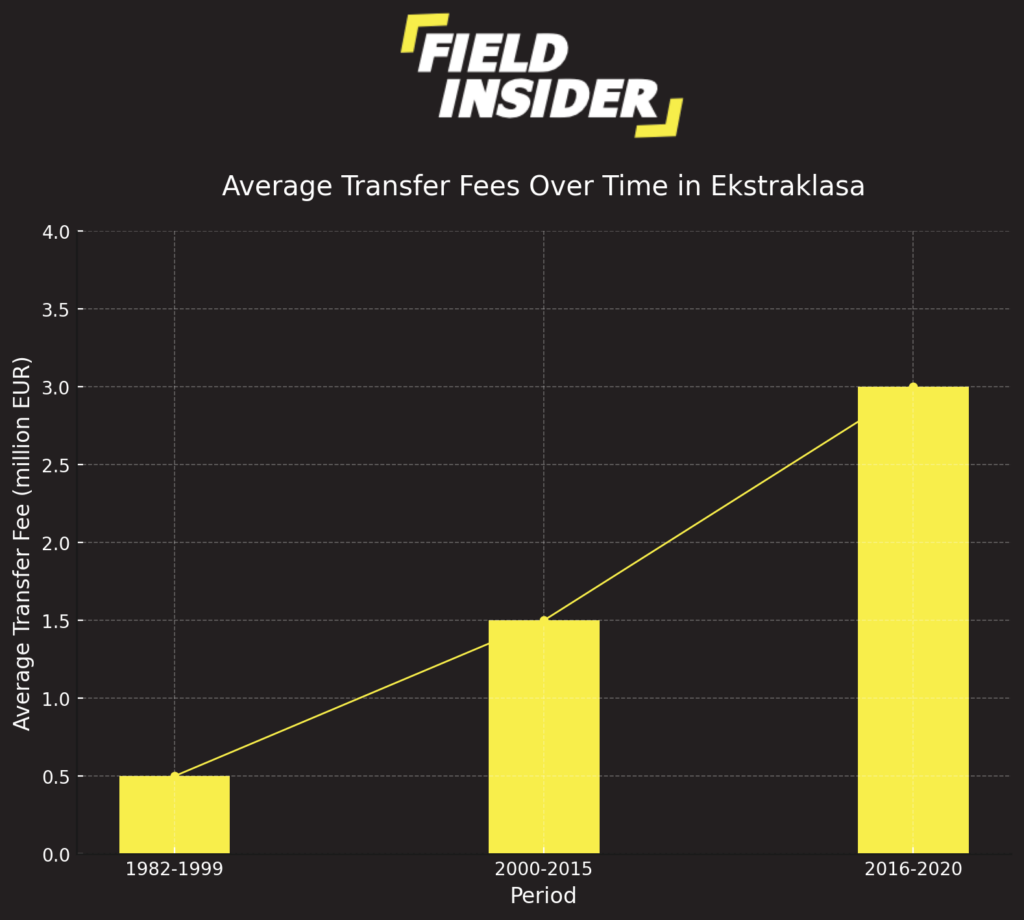
Can a Football (Soccer) Player still Leave under Contract?
It’s easy to recall instances where players simply handed in transfer requests, refused to play, and the club relented and allowed a transfer to take place, even for star players.
One important reason for this is the risk of disrupting the team’s dynamics. If the player refuses to play, the club will be sitting on a valuable asset, which will lose value over time.
The Purpose of Football (Soccer) Agents
Football player contracts are complex and have many facets. The footballer’s agent negotiates contracts and seeks the best financial deal for the player while also maximizing the player’s freedom and power.
Football (soccer) clubs make certain that the players get the money they desire. However, the player’s market value is maintained if they have plenty of time left on their contract.
Aspect Of Contract Determination

The formation of a football contract involves several critical factors and key individuals.
These elements, often considered the cornerstone of a football contract, play a crucial role in shaping its structure and content.
Key features of a football contract typically encompass the following:
- Salary or wage compensation
- Agents
- Add-ons
- Clauses
1. Salary
The salary or wage is the first and most important aspect of football contracts. This is frequently expressed as the weekly wage rather than the annual salary in footballer contracts.
The average weekly wage in the Premier League is £61,000 (before tax). This has increased by more than £10,000 in the last two seasons.
Showing the rapid rise in player wages as well as rising transfer fees., in Europe’s other leagues, the average player earns significantly less per week.
This demonstrates why the Premier League has such a strong pull for all players.
How do Football (Soccer) Clubs and Players Reach an Agreed Value?
Footballers rarely accept wage reductions. Unless they are older and nearing the end of their career, they will most likely join clubs at a lower level.
This means that if a player transfers to another club, his or her new salary will almost always be equal to or higher than their previous salary, particularly if they join a Premier League club. Contract renewals are analogous.
As their contract expires, players will frequently re-sign for a higher salary to reflect market inflation. This makes the player more valuable or simply persuades the player to stay with the club.
2. Agent
Football (soccer) agents represent footballers and negotiate their contracts, among other things. Agents typically have a large number of clients and thus represent multiple players at the same time.
‘Super agents’ are game agents who represent many of the game’s most elite and valuable players.; those who earn the most money in the game.
Agent fees, which are included in player contracts, are one way that agents make money. It is typically a percentage of the player’s earnings, so the agent will negotiate the highest possible wage for their client.
However, they also act in their own self-interest by attempting to earn more commission.
soccer agents; bad reputation?
In the game, super agents have a bad reputation. They have been accused of causing trouble between players and clubs so that a transfer occurs, where the agent can make money through the commission of the transfer fee, in addition to earning more money through higher wages at a new club.
3. Bonuses ANd Add-ons
Add-ons are another incentive that is very common in soccer contracts. They are additional compensation outside the contractual salary (wage) of the player.
Add-ons includes bonus which could be to show appreciation for an achievement or entice new footballers, signing on fees, or loyalty bonuses for players after they have played a certain length with the club.
Even though the wages alone appear to be exorbitant in the modern game, performance-related bonuses are almost always included in footballer contracts. A common bonus for an attacking player, for example, is based on a goal-scoring target. Similarly, for defenders and goalkeepers, clean sheet bonuses are used.
competition bonuses:
Many contracts include competition bonuses, so if a team wins a cup or league or qualifies for the Champions League, this will often trigger a bonus for players if it is in their contract.
However, not all bonuses are performance-based, as almost every contract includes an ‘appearance fee.’ This is simply a bonus for each game played by the player.
performance-related bonuses:
Bonuses may appear to benefit only players, but clubs can use performance-related bonuses to incentivize players and improve performance.
In addition, if a club is unable to afford a high wage for a player, bonuses can be used to ensure that the player is only rewarded when the team is performing well.
4. Clauses
Along with bonuses, footballer contracts contain a number of clauses. Clauses differ in that they aren’t always about money. They can include pretty much anything agreed upon by the player and the club.
‘match highest earner’ clause:
The match highest earner clause’ is a common clause in footballer contracts. A key player in a team, such as Messi or Ronaldo, may request that this be included in their contract.
It basically means that if a club signs a new player or renews an existing player’s contract for a higher wage than Messi, Messi’s wage will automatically increase to match the highest earner.
A yearly wage increase, a wage increase based on the number of games played, or a contract extension if a player plays a certain number of games in a season are all examples of traditional clauses.
The Release Clause
The ‘release clause’ is one of the most common clauses. These are relatively uncommon in Premier League footballer contracts but more common in other European Leagues.
A release clause is a pre-agreed-upon amount for which another team can bid on a player, with the selling team obligated to accept the offer.
When entering into long-term contracts, players have an element of freedom because they know that if a club is willing to pay a certain amount, they will have the option to leave, even if the selling club does not want them to.
Of course, this gives the club less power. The release clause is usually in the form of a very large sum in excess of the player’s market value.
Spanish Soccer Release Clauses
Release clauses work differently in Spanish football (soccer). The money must be provided by the player to the Spanish FA.
The player would have to receive this money from the club that wishes to activate the clause, who would then transfer it to league officials.
There, they approve the contract termination and hand over the money to the selling club. In 2019, Antione Griezmann left Atletico Madrid for Barcelona after Atletico Madrid triggered the €120 million release clause.
Top 8 Highest Release Clauses in La Liga
| Player | Team | Release Clause |
| Jude Bellingham | Real Madrid | €1bn (£871m/$1.08bn) |
| Ansu Fati | Barcelona | €1bn (£871m/$1.08bn) |
| Pedri | Barcelona | €1bn (£871m/$1.08bn) |
| Ronald Araujo | Barcelona | €1bn (£871m/$1.08bn) |
| Gavi | Barcelona | €1bn (£871m/$1.08bn) |
| Ferran Torres | Barcelona | €1bn (£871m/$1.08bn) |
| Vinicius Junior | Real Madrid | €1bn (£871m/$1.08bn) |
| Eduardo Camavinga | Real Madrid | €1bn (£871m/$1.08bn) |
Thinking Ahead
Release clauses can also take effect in certain circumstances. There can be relegation release clauses, for example, where if a club is relegated, the clause takes effect. Release clauses may also be limited to specific buying clubs.
If a player wants to ensure that his team doesn’t refuse him a move to a big club, the clause can be tailored to only apply to Champions League clubs or even specific clubs.
About Unusual Clauses IN Football (Soccer) COntracts
Astronaut Schwarz
Some clauses in football (soccer) player contracts are simply bizarre. When Stefan Schwarz joined Sunderland in 1999, he had mentioned that he wanted to go to space one day, so the club put a clause in his contract that prohibited him from doing so!
Sunderland felt the need to include this clause in his contract because it was believed that commercial space travel would be available within the next 5 years. Needless to say, we don’t believe the clause had any effect on Stefan Schwarz’s lack of interstellar travel.
Flights on the House
Neymar’s contract with Barcelona included a clause that allowed a number of his Santos friends to visit him every couple of months, with his club covering the cost of their travel and lodging.
Former Barcelona President Rosell revealed that as part of the contractual agreement, the club paid $430,000 to fly Neymar’s entourage, the ‘Toiss,’ over from Brazil in a private jet.
Family Ties
This isn’t uncommon, as to prevent homesickness in foreign signings, there are often clauses in the contract that ensure the player can have family visits or travel home.
AC Milan goalkeeper Gigi Donnarumma’s career was marred by controversy when, just a day after finally signing a new contract, the club also signed his older brother on what was perceived to be a very generous salary.
Gigi and his agent clearly negotiated this contentious transfer as part of his new contract, even if it was not an official contractual clause.
Top Salary Earners In Football 2023
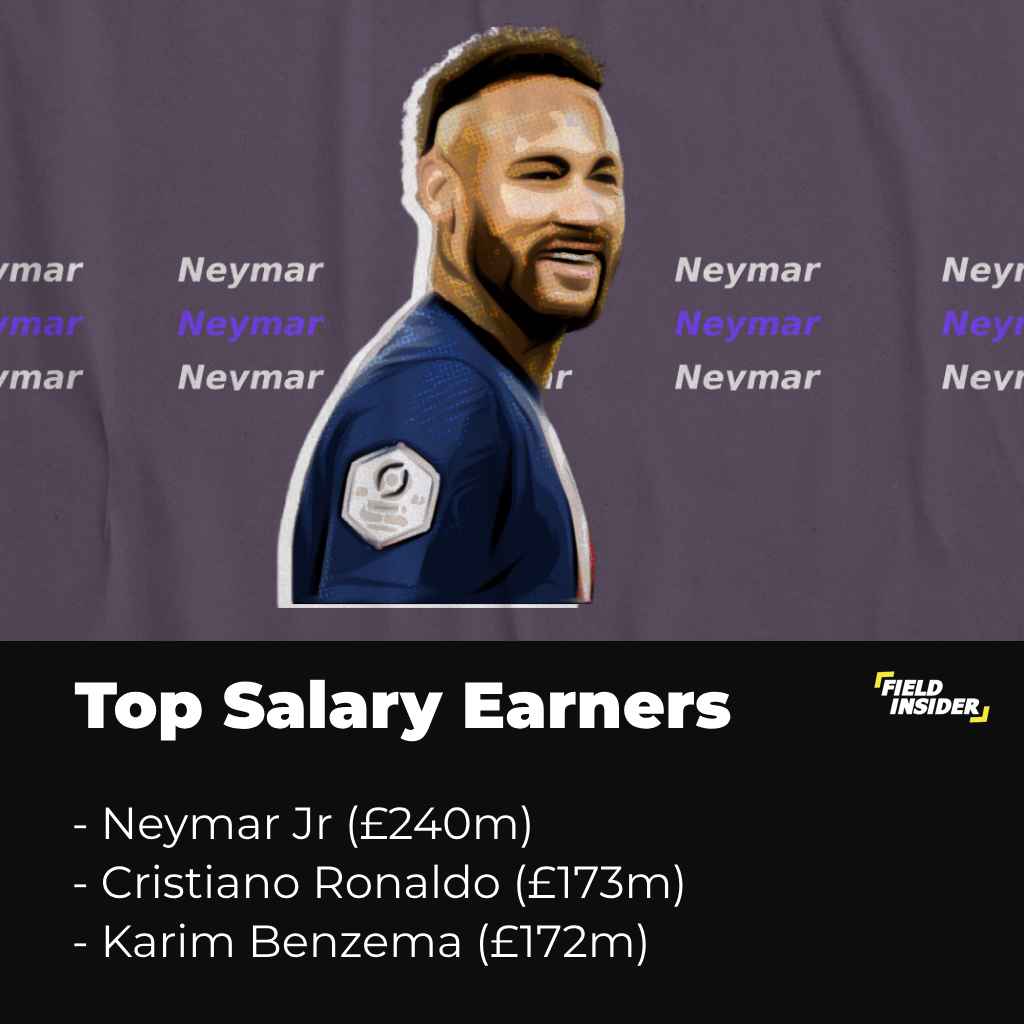
| Player | Team | Annual Wage |
|---|---|---|
| Neymar Jr | Al-Hilal | £240m |
| Cristiano Ronaldo | Al-Nassr | £173m |
| Karim Benzema | Al-Ittihad | £172m |
| Kylian Mbappe | Paris Saint-Germain | £100m |
| N’Golo Kante | Al-Ittihad | £86m |
| Lionel Messi | Inter Miami | £42m |
| Frendik De Jong | Barcelona | £32m |
Conclusion
In conclusion, the dynamic and complex nature of football contracts mirrors the sport’s continuous evolution and intricate landscape.
These contracts do more than just lay down legal terms; they reflect the shifting strategies, economic values, and global trends of football. They also serve as key indicators of a player’s market value and potential, playing a pivotal role in shaping their career trajectory.





